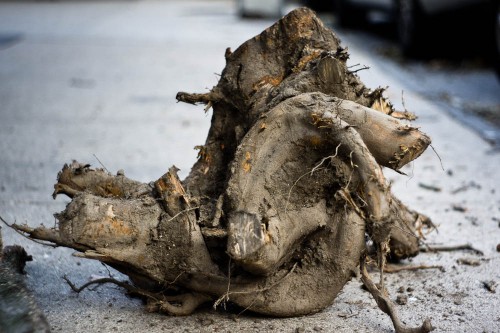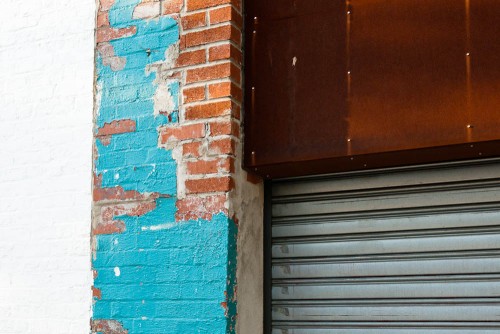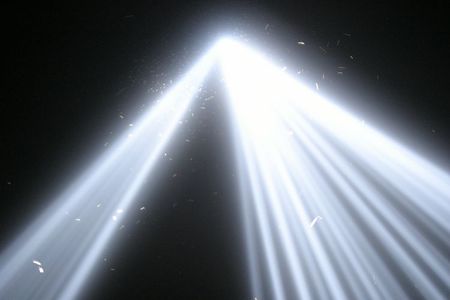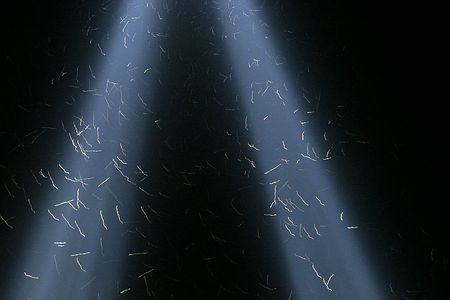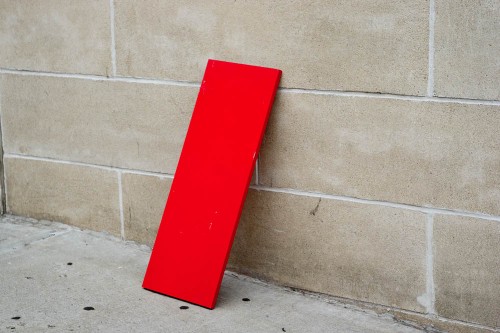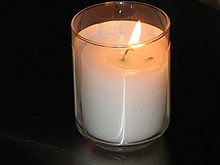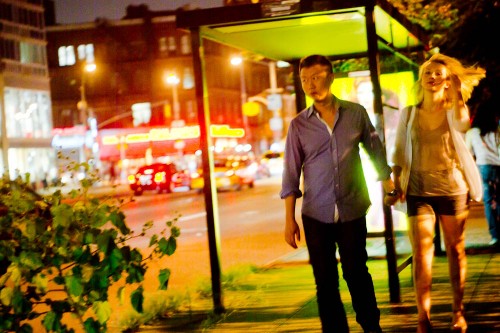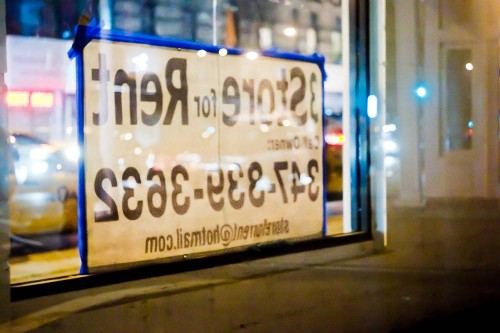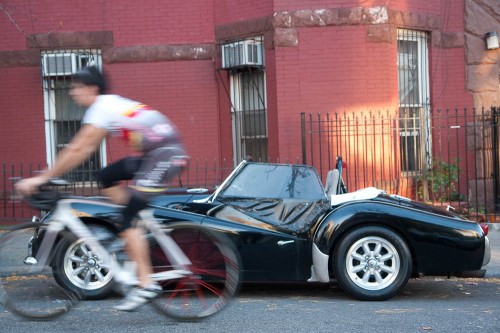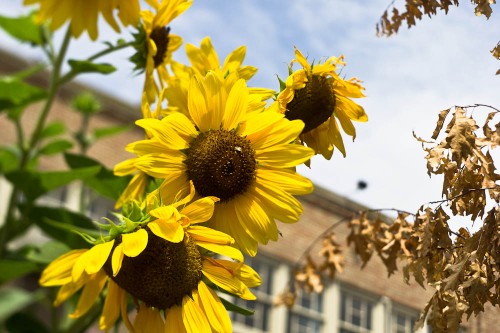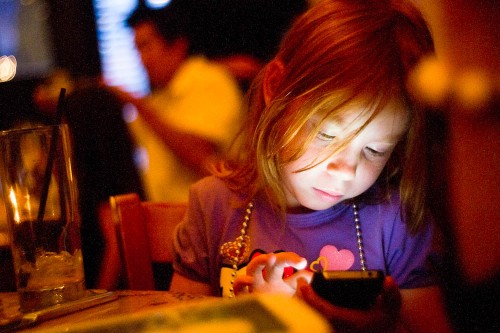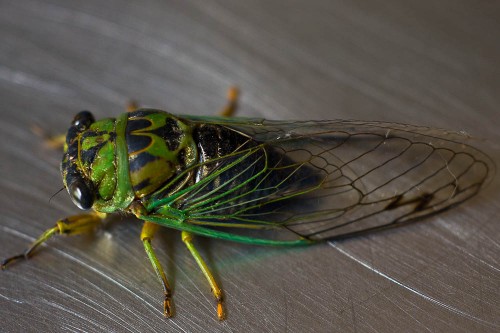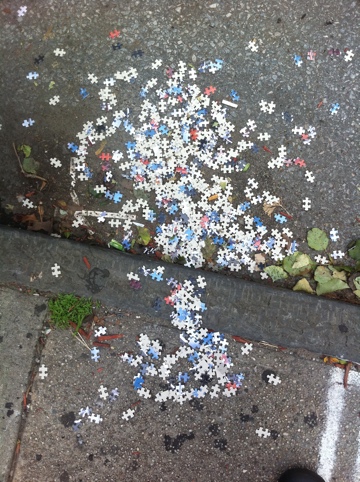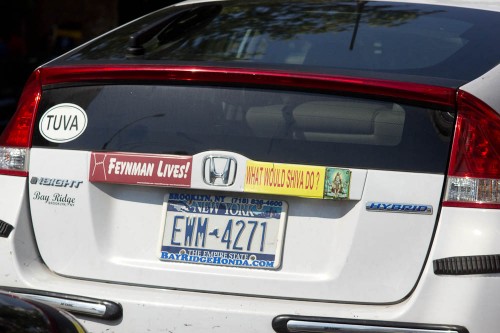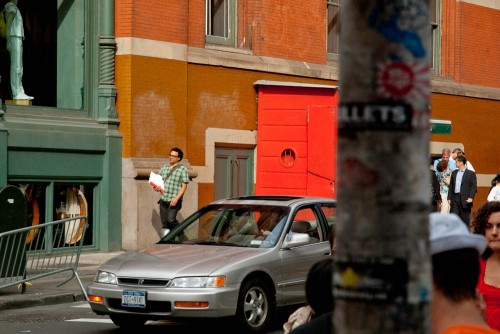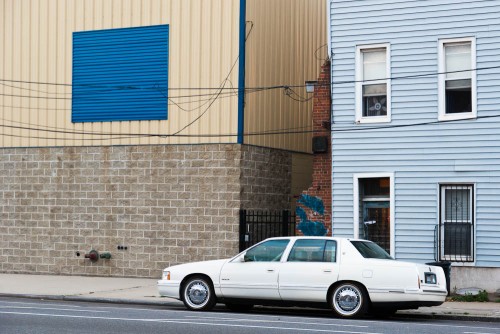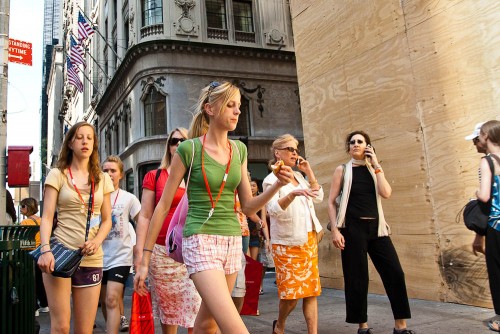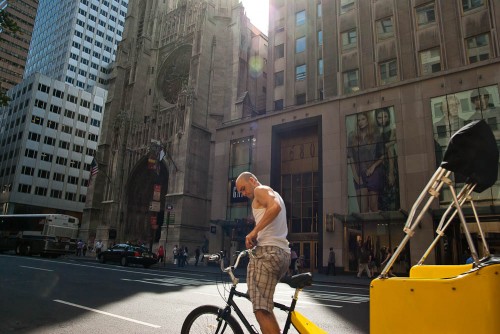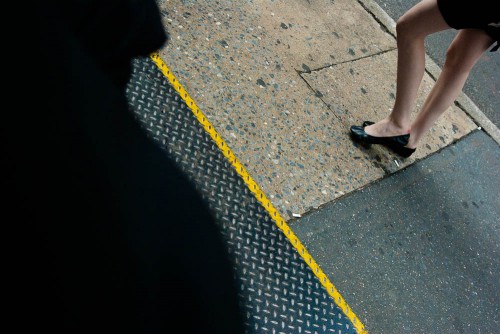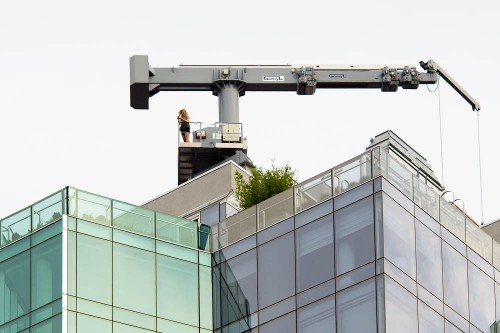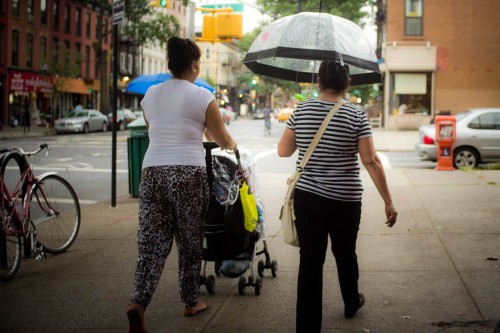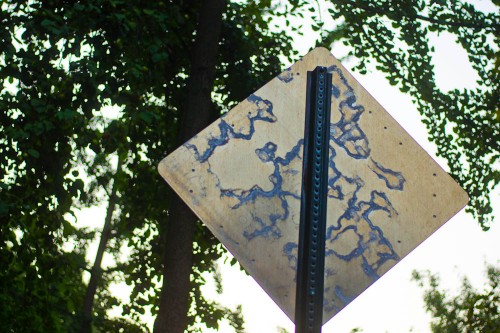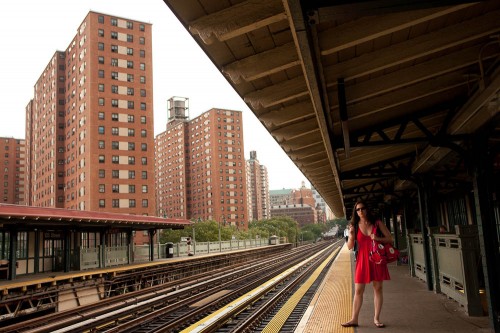All posts by admin
Sept 15: Italian America: History, Politics and the Everyday
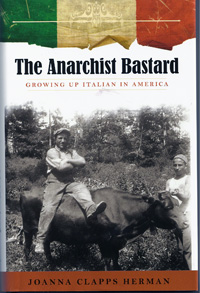 RE-THINKING ITALIAN AMERICA AT BROOKLYN READING WORKS ON SEPTEMBER 15, 2011.
RE-THINKING ITALIAN AMERICA AT BROOKLYN READING WORKS ON SEPTEMBER 15, 2011.
Brooklyn Reading Works at The Old Stone House presents Italians in America: History, Politics and the Everyday. On September 15th at 8PM curator Joanna Clapps Herman brings together a group of Italian American scholars and authors who examine the details of history as it was created, lived and spoken, but until very recently hidden from view of the larger academic and literary world in America.
As an American ethnic tribe, Italian-Americans came later than some other ethnic groups to studying and writing about the details of custom, culture, folkways and history of their people.
In the last 25 years however the flood gates have opened and there is now a rich body of written material examining all aspects of cultural history and daily ways of life. Each of the authors at this reading brings to light a particular aspect here-to-fore not examined piece of the Italian American way of life: history, language, vernacular culture and archaic customs preserved.
Joseph Sciorra is the Associate Director for Academic and Cultural Programs at the John D. Calandra Italian American Institute, Queens College (City University of New York). As a folklorist, he has published on religious practices, cultural landscapes, and popular music.
Nancy C. Carnevale is Associate Professor of History at Montclair State University and author of A New Language, A New World: Italian Immigrants in the United States, 1890-1945 (University of Illinois Press, 2009), winner of a 2010 American Book Award.
Jennifer Guglielmo specializes in the history of immigration, race, women, and labor in the United States, and is an Associate Professor of History at Smith College. Her recent book Living the Revolution: Italian Women’s Resistance and Radicalism in New York City, 1880-1945 (UNC Press, 2010) documents Italian immigrant women’s commitment to revolutionary and transnational social movements, and explores how this activism diminished as they became white working-class Americans.
Joanna Clapps Herman has published poetry, fiction, memoirs and essays. Her latest publication is her memoir, The Anarchist Bastard: Growing Up Italian In America (SUNY Albany Press, March 2011) She is co-editor of Wild Dreams: The Best of Italian Americana (Fordham University Press, 2008), as well as co-editor of Our Roots Are Deep With Passion (Other Press, 2007).
When: September, 15, 2011 at 8PM
Where: The Old Stone House in Park Slope on 3rd Street between 5th and 4th Avenues. Note: due to construction in park enter from west side of the house.
What else: $5 suggested donation includes wine and refreshments. Books for sale.
For more information about the authors and the event please contact Louise Crawford at 718-288-4290 or louise_crawford@yahoo.com
BROOKLYN READING WORKS 2011-21012 SEASON:
September 15, 2011: Italian Americans: History, Politics and the Everyday curated by Joanna Clapps Herman
October 6, 2011: Tranformations on the Tongue curated by Pat Smith
November 17, 2011: Make Mine a Double (Why Women Like Us Like to Drink) curated by Gina Barreca
December 8, 2011: A Taste of Salt, a reading with novelist Martha Southgate and others.
January 12, 2001: The Truth and the Ghost Writer curated by John Guidry
March 15, 2012: The Year of the Dragon: Voices from the East curated by Sophia Romero
May 10: Edgy Mother’s Day curated by Louise Crawford and Sophia Romer
Postcard from the Slope: Begin to Begin
First published on September 12, 2005.
In the new normal, September 11th is the new Labor Day. By that I mean that the autumn season doesn’t officially begin until we have mourned our losses from 9/11.
Falling on a Sunday, this year’s anniversary did feel like a national day of remembrance. Even though it looked like a typical fall Sunday and people did typical Sunday things – it wasn’t really a typical day at all. At Ground Zero, at houses of worship, homes, firehouses, cemeteries, gardens, and on streets throughout the city, people commemorated the loss of the nearly 3000 people who died on September 11. Bells tolled at the exact times the planes hit, as well as the times the south and north towers fell.
This year, I didn’t take part in any 9/11 memorial activities. In the past I have gone to the Brooklyn Botanic Garden to meditate on the grass or to Old First Church to sit and listen to the church bells ring. Last year I attended a dinner at Al Di La given by a friend whose husband died on that day. She wanted to thank all her friends for their support and love.
Yesterday, I was aware of it being September 11th from the moment I woke up. Listening to the names being read at Ground Zero was a stark reminder. And this year the siblings read the names, which brought its own stirring poignancy.
I don’t think the beginning of September will ever mean anything other than 9/11 and the dispair we felt on that day. And September 12th will always bring relief because on that day in 2001 we slowly began to put back the pieces. We also truly connected to one another and felt a real sense of solidarity. That is also the legacy of 9/11, Through our tears, our panic, and our bewilderment, we began the protracted healing process that continues to this day.
9/11 will always be the day we took the hit. But on the day after, we begin to begin again and celebrate the goodness that persists despite the evil we have seen.
No Words Daily Pix by Hugh Crawford
Vertical Columns of Light
The Names
First published on September 11, 2005:
Like that day four years ago, I woke up this morning and went directly to the kitchen and switched on the radio.
The Names. The siblings of those who perished are reading the names. They are reading the names and saying so much more.
A woman just read the name of her twin sister. Her twin. As a twin, this makes me cry. The voices are beautiful. Some read clearly with no obvious grief in their voices. Others can barely get the names out. Slowly, haltingly, with emotion in their voices, many break down when they get to the their siblings name. Some mispronounce a name. They apologize or say “Excuse me” and I cringe for the family of that person – listening in the stands at Ground Zero or at home watching the TV.
Each reader ends with the name of his/or her sibling. Some add words like: “See you, bro.” “We can see your smile and hear your laughter.” “I would give up tomorrow for one more yesterday with you.” “We love you and we miss you. ” “Shake it easy, Sal.” “Your spirit is in me each and every day.” I know you always look over me.” “We will see you in heaven.” “We know you are watching over us.” “We miss you and your contagious chuckle.” “My son kisses your picture every day.” “I see your face every day in the mirror.” We cannot wait to be with you again.”
I know from my work with the FDNY that the siblings were deeply grateful to be asked to read the names of their brothers and sisters. Many feel that their grief went unacknowledged. Few recognized the unrelenting grief that a sibling feels. One sibling told me: “I still have pain everyday. People look at me and say, ‘Still?’” I just heard this woman read her brother’s name. And she added: “This world was never meant for one as beautiful as you.”
It is 9:45 and they are at the end of the D’s: Duarte. Duda. Duffy. Dukas. Because of my work with the FDNY, I recognize many names and I cherish the names I have typed out on my keyboard, the names of those whose family members I have talked to on the phone, the names of those whose life stories I have researched and written.
I am waiting for the names of those I know who died that day, whose wives I see at PS 321, at Starbucks, at the nail salon, and on the streets of Seventh Avenue. I observe them, monitor their moods, their haircuts, watch their children grow, wonder how they are doing, and know that I can barely fathom what they have been through
Last year on the night of September 11th, I saw the wife of a man who died that day, creating a beautiful mosaic outside of her brownstone. It was midnight and the Tribute of Lights was visible in the sky above her.
The F’s are being read now. Fredo, Flannery, Fagin…I am waiting to hear David Fontana’s name…I just heard it. It went by so quickly. Too quickly. I don’t want to get beyond the F’s. I want to hear his name again.
The third moment of silence begins to mark when the south tower fell. A bell rings three times. On the radio, the sound of wind, the noisy sound of silence: “Hello Darkness my old friend, I come to talk with you again…”
And then back to the simple incantation of the names. So powerful, so beautiful, so moving. And the heartfelt words added by the siblings. Simple sentiments of grief.
There are so many ways to say the same thing: I miss you. I love you. Nothing is the same without you.
As one brother just said, “Thanks for the memory, kiddo.”
Eulogy
This is an excerpt from Marian Fontana’s eulogy for her husband Lt. Dave Fontana of the FDNY, who died on 9/11.
“Aidan, love is the only thing that lasts forever, and even though Daddy’s gone, I hope you will remember how much your daddy loved you and keep that in your heart for the rest of your life. I have tried hard to find the good to come out of losing the love of my life. This summer, Dave insisted on buying a hat that he saw his friend, Jerry, at the firehouse wearing. It read “Life is good” and for Dave it truly was, especially in his last months.
“Dave strove to live his life fully, to love his family and friends, to feel his feelings and be an honest and good man. I think he accomplished that. I hope everyone here will use Dave’s life as an example. I know I will. So tell the people around you that you love them, mend grudges, don’t stay angry with people, and be kind. Dave did these things. His heart was as large as his frame and I feel privileged to have called myself Dave’s wife.
“An excerpt from Marian Fontana’s eulogy for Dave Fontana spoken at his funeral on October 25, 2001.
Aidan, love is the only thing that lasts forever, and even thoughDaddy’s gone, I hope you will remember how much your daddy loved youand keep that in your heart for the rest of your life.
“I have tried hard to find the good to come out of losing the love of mylife. This summer, Dave insisted on buying a hat that he saw his friend Jerry at the firehouse wearing. It read “Life is good” and for Dave truly was, especially in his last months.
“Dave strove to live his life fully, to love his family and friends, to feel his feelings, and to be an honest and good man. I think he accomplished that. I hope everyone here will use Dave’s life as an example. I know I will. So tell the people around you that you love them, mend grudges, don’t stay angry with people, and be kind. Dave did these things. His heart was as large as his frame and I feel privileged to have called myself Dave’s wife.”
No Words Daily Pix by Hugh Crawford
Last Picture of WTC by Bob Guskind
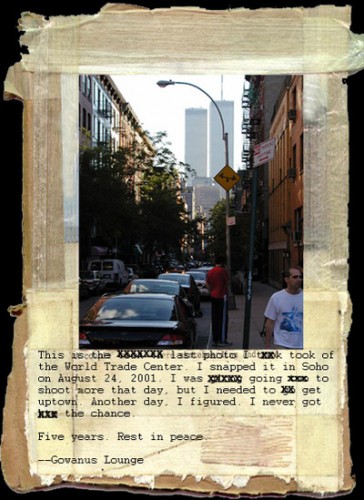 The late Bob Guskind of the late, great Gowanus Lounge, made this beautiful collage with the last photo he took of the WTC on August 24th, 2001, masking tape, and his typewritten words.
The late Bob Guskind of the late, great Gowanus Lounge, made this beautiful collage with the last photo he took of the WTC on August 24th, 2001, masking tape, and his typewritten words.
Remembering
Blighted Air
Your health
went to hell
after the terrorists
blasted our city
White ash spat
on your September Eleventh Street
sticking to sad shoes
The unmentionable odor of death
suffocated your lungs
delivering you
to the empty hospital
where the missing
were supposed to be
Inside the oxygen tent
W.H. Auden’s poem
lay open on your bed
We must love one another or die
seven words of resuscitation
for short, quivering breath
Only poetry can
restore
–Louise Crawford (with italicized lines from W.H. Auden)
9/11: I Can’t Believe It’s Been Ten Years
The 10th anniversary of 9/11 is just a day away. A day, which many have been anticipating with anxiety and dread because of the onslaught of commemoration—media and otherwise. It is a day which will be filled with many still raw memories.
“I can’t believe it’s been ten years” is probably the most common response to the impending anniversary. “In some ways it feels like it just happened but in many ways it just feels like it was a bad dream so far in the past,” write Pat Tambour, a NYC performer now living in Nashville. “Witnessing the whole event outside my apartment window has made it difficult in terms of not dwelling on it too much.”
Many watched the towers fall from the rooftops. Dust, ash and debris from the fallen buildings floated over the neighborhood. People lined up to give blood at Methodist Hospital when they still thought there would be wounded survivors from the towers.
The local public schools stayed open until the early evening refusing to close until every child had been picked up by parents or guardians, who were stranded in Manhattan.
Some parents arrived with thick white ash on their shoes. Some parents didn’t arrive at all.
By evening there was a growing list of missing Park Slopers including 11 firefighters from Squad 1, but there was still hope that they would surface. In the days that followed those hopes were dashed.
In my apartment building on Third Street, many of us gathered in a neighbor’s first floor apartment to watch television while our young children played. We were desperate to follow the news of the day but also mindful that the images were disturbing and confusing to our children.
During the afternoon, a woman on my block set up a folding table on the sidewalk covered with yellow pads and pens. “It’s for people who want to write down what they are feeling,” she told me.
I spent that evening and many days after in the apartment of a friend who’s husband, a Squad 1 firefighter, was missing. We called hospitals in New Jersey hoping that he had somehow ended up there. At midnight, two firefighters, their skin bright red, reeking of smoke and covered in ash and debris, arrived to assure my friend that there was still hope. “There are voids, where the guys might be,” they told us.
In the days and weeks that followed, the neighborhood came together to mourn the dead and support the living.
The Community Bookstore became a community center, an information hub and a drop-off point for supplies needed at Ground Zero. The store’s front window was covered with supply lists, poems, hand-written notes and newspaper articles, including condolences and expressions of empathy people from all over the world. Indeed, for the first few weeks, before 9/11 was used as a reason to go to war, it felt like the whole world was in solidarity.
Across the street from the bookstore, Old First Dutch Reformed Church was kept open for prayer and reflection. One night that first week, there was packed service for the community where everyone rose to sing, “God Bless America.”
On the Friday after that terrible Tuesday there was huge candlelight vigil on Seventh Avenue, which ended in front of Squad 1 on Union Street, where locals paid their respects to first responders who had given their lives and those who had survived. The guys at Squad 1 were our heroes and every time we saw a fire truck we waved in gratitude, a local custom that went on for at least a year if not more.
When word got out a few weeks later that the Fire Commissioner was planning, in a budget saving measure, to close Squad 1, there was a huge protest in front of the firehouse. Before the demonstration was over, his decision was reversed to the relief and jubilation of the crowd.
Eventually, Park Slope got back to a new normal. The kids returned to school and the adults got on with their lives. The first few anniversaries were very fraught and very sad. More recently it has felt like just another day. Sort of. Those young children like my daughter who barely knew what they were seeing on the television back then are in high school now. The middle schoolers, who watched the towers fall from the windows of MS 51 are now in college.
For them, 9/11 must feel like a long time ago. For their parents, that’s not the case. Indeed, we are still experiencing the grief and loss. Yes, we are back to normal but the reminder of it is painful in a very profound way as it is a dark, traumatic memory. When I think about the anniversary I sort of wince. My instinct is to hide under the covers.
Others like Michele Madigan Sommerville, a poet and writer, believe that rituals are needed. “I think people are going to need ritual and poetry and song and the words of the most directly affected. I also think there’s a whole generation of children who were not old enough to be aware a decade ago—who will be very aware and very much in need of support.”
Facing the 9/11 Anniversary with Music and Prayer
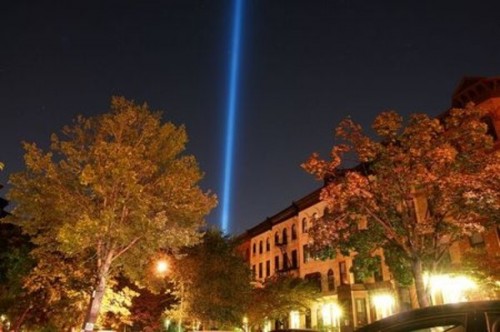 Unbelievably, the tenth anniversary of the September 11, 2001 attacks is tomorrow. WNYC radio has been on all morning with its special “Living 9/11” coverage. The voices of family members who lost loved ones, survivors and witnesses is forcing me to re-live the day. Yet, I can’t turn it off.
Unbelievably, the tenth anniversary of the September 11, 2001 attacks is tomorrow. WNYC radio has been on all morning with its special “Living 9/11” coverage. The voices of family members who lost loved ones, survivors and witnesses is forcing me to re-live the day. Yet, I can’t turn it off.
In my quest to understand how people are feeling about the anniversary, I contacted clergy in the Park Slope area to see how they are approaching the anniversary of an event that changed New York City and the nation, and surely changed New Yorkers.
“It strikes me that we’re still in a case of low-level shock, and we still haven’t faced all the meaning of what we experienced,” Reverend Daniel Meeter of Old First Dutch Reformed Church wrote via E-mail.
Since the anniversary falls on a Sunday, the church will likely be filled with parishioners who, like Rev. Meeter, are still grappling with the enormity of that sunny, yet terrible September day.
“We are having special prayers and testimonies in our morning services,” he wrote. “Then we’re opening the sanctuary for prayer and meditation and hanging up the prayer sheets which people wrote the prayers on ten years ago.”
Indeed, in the days and weeks after 9/11, Old First opened its doors to the general public for prayer vigils and silent meditation. I remember those prayer sheets. They were white bed sheets, which men, women and children were invited to write or draw on. Their words and pictures were displayed in the church’s vestibule for months, a hanging vigil for all of those who were lost in the attacks.
On the first anniversary of 9/11, I remember spending my morning in the church listening to a program of classical music performed by local musicians.
Tomorrow afternoon at 5 p.m., Rev. Meeter will join Rabbi Andy Bachman of Congregation Beth Elohim (CBE) at his synagogue, on Eighth Avenue at Garfield Place, for an interfaith service open to the entire community. Brooklyn Conservatory’s Community Orchestra and Chorale, the CBE Singers and the synagogue’s cantor, Joshua Breitzer will be on the program. At the service, Rabbi Bachman will deliver a sermon and the memorial will conclude with a group singing of “America the Beautiful.”
Rabbi Ellen Lippmann of Kolot Chayeinu will organize a different commemoration for the tenth anniversary of 9/11. The Eighth Annual Children of Abraham Peace Walk will begin at 2 p.m. on September 11. This walk is for Jews, Christians, Muslims and “all people who want to remember those who died on 9/11 and commemorate the spirit of friendship that supported so many thereafter” will commence at a the Dawood Mosque in Brooklyn Heights (143 State Street), cross the Brooklyn Bridge and conclude at Charlotte’s Place, a community center in lower Manhattan.
Perhaps it’s appropriate that Rabbi Lippmann’s most vivid recollection of Park Slope in the days after 9/11 was a candlelight vigil down Seventh Avenue.
“It was a Friday evening a few days after 9/11, and we were in Sabbath services,” she said. “We left, bringing candles, and joined what turned out to be a sea of people with candles all along Seventh Avenue as far as the eye could see, heading for the fire house on Union Street, I think, offering our presence in comfort for their many losses. What sorrow! What impact! What a sight!”
Also on September 11, the Brooklyn Conservatory of Music, on Seventh Avenue between Lincoln and St. Johns places, will hold a day-long 9/11 commemoration and the Brooklyn Art Song Societywill perform at noon. At 2 p.m., Ron Jackson will play guitar and recite poetry at the Community Bookstore. At 3 p.m., BaroQue Across the River and Dancewave will bring music and dance to the Conservatory.
In anticipation of the anniversary, I asked Rabbi Bachman what he best remembers about the aftermath of the tragedy ten years ago.
“As I’ve reflected on these last ten years,” Rabbi Bachman said. “I’ve been most impressed with stories of incredibly generous humanity that was expressed that day and in the following weeks and months—as if a hardened city was traumatized into softening its exterior, if only temporarily.”

